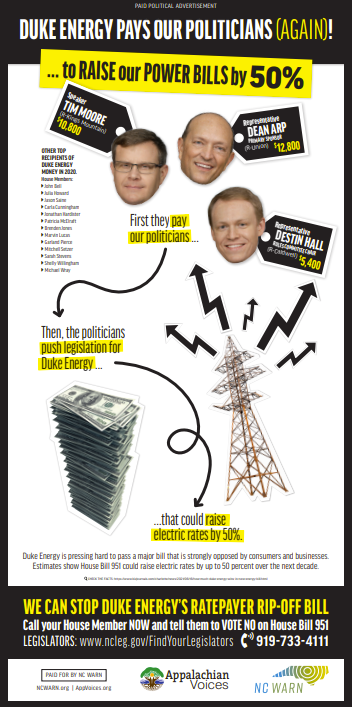On June 15, 2021, an energy bill was introduced in the NC House – the result of months of secret meetings between the House GOP, Duke Energy and a few other hand-picked stakeholders. The process excluded all Democrats and all environmental and consumer advocates. A month later, it passed the House in the wee hours of July 15 and moved to the Senate.
The backroom bill didn’t even mention climate change. Moreover, it not only supported but mandated what Duke Energy had been pushing for: construction of new fracked gas-burning power plants. It also gutted the authority of the NC Utilities Commission to make Duke prove it needs them.
We and allies had defeated a similar bill 2 years ago.
The bill seemed destined for a gubernatorial veto until Republican legislators agreed to sit down with Democrats and the Governor, and a compromise was reached, which the Governor signed in October. Read our October 4 statement on the new version of this bill, which still fell short on climate and ratepayer protection.
2022 Update: The NC Carbon Plan
HB 951 tasked the Utilities Commission with establishing a carbon plan for the state’s electric utilities that would take effect by Dec. 31, 2022 and would cut carbon dioxide emissions 70% by 2030 and achieve net zero carbon dioxide emissions by 2050. Duke Energy will draft a plan by May 16, 2022 and is making some materials public here.
People Power NC, a group of climate, clean energy and social justice organizations including NC WARN, has published “12 Principles for a Carbon Plan in the Public Interest” and will evaluate the draft plan against those principles. Public hearings will be held in July and August.
Get more info on HB951:
Text of the original bill
Text of the October revision
Info sheet from Energy Justice NC coalition
Newspaper ad by NC WARN and Appalachian Voices
NC WARN’s initial statement on HB951
News & Observer/Charlotte Observer editorial
Find links to news coverage at the bottom of this page

“The House Republican energy legislation revealed for the first time this week would cost ratepayers too much, fall short of clean energy goals, hamper job recruitment and weaken the Utilities Commission which exists to provide accountability for utility companies. It takes some steps toward more renewable energy but not nearly enough and it’s clear they need to go back to the drawing board and negotiate with a broader spectrum of stakeholders in order to get a better plan.”
— NC Governor Roy Cooper
Recent News
The revised N.C. energy bill is better, but it should do more to stem climate change — N&O/Charlotte Observer
On a major bill that will shape North Carolina’s energy future, Democratic Gov. Roy Cooper and Republican legislative leaders have reached what’s being called a compromise. But if that’s what House Bill 951 is, it’s an odd one.
SEE ALL HB 951 POSTSBipartisan support for energy bill as some worry over costs, ‘ambiguities’ – WRAL
NC WARN, often the state’s most ardent environmental advocate, blasted the bill and the governor for supporting it, saying it “gives cover for the Charlotte-based corporate giant to continue its climate-wrecking expansion of gas-fired power plants.”
SEE ALL HB 951 POSTS
